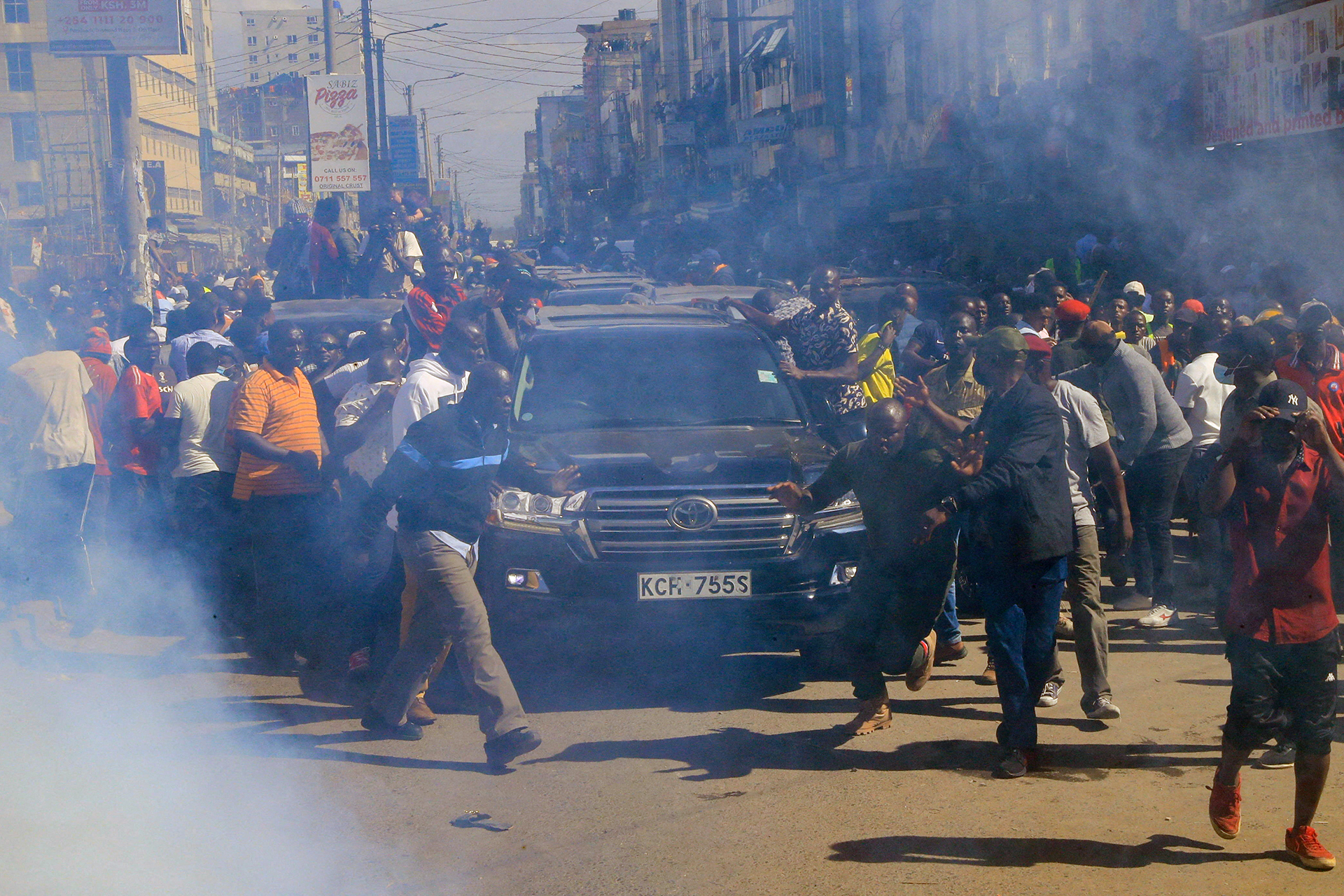Nairobi - Violent clashes between police and supporters of opposition leader Raila Odinga have seen violent clashes between police and supporters of opposition leader Raila Odinga, which resulted in the destruction of several properties and the arrest of at least 3 opposition lawmakers and several protesters.
Last week, the opposition leader called for weekly demonstrations on Monday and Thursday to push President William Ruto to resign or reduce the cost of living, and protesters tried to reach the presidential palace as planned, but were blocked by police after blocking all roads surrounding the palace.
The capital experienced economic paralysis on Monday after most shops closed for fear of looting, causing losses of about two billion Kenyan shillings ($15 million), according to Kenyan Vice President Regathy Gachagua, who called for the protests to be cancelled and for reflection on the toll on the economy.
The demonstrations began in the middle of this month and were called by the opposition leader to be weekly on Monday and Thursday (Reuters)
Economic reasons
In late February, opposition leader Raila Odinga announced that President William Ruto's government had 14 days to improve the living conditions of Kenyans, before announcing street action, and on 14 of this month, Odinga announced the end of the deadline, and called on his supporters to take to the march to the presidential palace.
This comes in protest against the economic deterioration that the country has been witnessing since the beginning of this year, which economists link to the collapse of the local currency against the dollar, especially in the last 60 days, which led to a shortage of foreign exchange reserves that the country has not seen since 2008.
Kenya's trade minister denied the government's responsibility in the crisis, calling it a global issue due to global conditions and the policies of the U.S. Federal Reserve.
Economist Abraham Kamau predicted that the weekly protests would further aggravate the situation, noting that the halt in economic activity would cause projects to close and shake foreign investors' confidence in the Kenyan economy, which would mean a contraction in foreign exchange flows.
Speaking to Al Jazeera Net, Camau added that the intransigence of the two sides and their insistence on their positions, will fall the ceiling on everyone unless there is a solution to stop these tensions.
The economic crisis has resulted in a rise in gasoline prices due to a shortage of dollars, and the head of the Pump Owners Association, Martin Chumba, said there was enough fuel in the warehouses, but companies did not have enough dollars to buy.
To mitigate the effects of this crisis, the government resorted to some Gulf countries to obtain fuel with a deferred payment of up to 6 months.
This crisis has directly affected the lives of Kenyans, as the cost of electricity in homes has risen, the consumer price index of the Office for National Statistics has shown inflation has risen, and shops have seen a contraction in demand for goods and services.
In this regard, Kenyan energy expert George Washira suggests rationalizing imports by prioritizing materials that contribute to local production, such as fertilizers and machinery, and dispensing with imported fuel through electric transport programs.
The call for demonstrations has political and economic reasons behind it and will further worsen the country, observers say (Reuters)
Political reasons
Although the opposition leader's focus on economic conditions to call on his supporters to demonstrate, he has not hidden the political motivation on some occasions.
Since William Ruto was declared president in August, Odinga has refused to recognize the outcome and has begun a series of challenges to Ruto's legitimacy, appealing to the Supreme Court, which rejected his petition for lack of evidence, prompting his ally, former President Uhuru Kenyatta to hand over power to William Ruto last September.
But Raila Odinga continued his protests, arguing that his victory had been stolen, demanding that President Ruto allow him to check the computer servers that had been used to count the votes, and to withdraw the nomination of new members to the election commission. But the president ignored these demands, which Odinga saw as reason enough to demonstrate alongside the economic demands.
President William Ruto reversed the attack the day before the demonstrations, saying the real reason Odinga called for demonstrations was to twist his arm to share the cake of governance, accusing him of being behind several coup attempts since 1982.
In a statement to Al Jazeera Net about these political tensions, lawyer and political analyst Javas Begambo said that the opposition protests were based on the constitutional right to demonstrate, but he did not rule out that behind the chaos that accompanied the events hidden hands is not in their interest to converge Roto with Raila, because they feed from this polarization bilateral.
Bigambo called on opposition leader Odinga to frame his supporters not to be drawn into violence, and called on the Kenyan president to ask the police to protect demonstrators, not suppress them, so that the two sides reach understandings that cannot exist in an atmosphere of violence.
What comes after the demonstrations?
For his part, law professor Makwa Mutawa believes that Kenya is living these days "a severe political eclipse of democracy due to the spread of corruption," as he described it, adding in press statements that the elite must join the people to revolt against the ruling class so as not to turn democracy into authoritarianism, calling for the continuation of protests.
On the other hand, political analyst Kedi Mwaga believes that the historical greed of Raila Odinga for power will have serious consequences for Kenya, considering in press statements that calling on his supporters to go out to demonstrate may cause bloodshed, which puts the country in a predicament that it may not be able to get out of easily, reminding him of the previous demonstrations he called for after he lost the 2017 elections, which led to the death of Kenyans.

